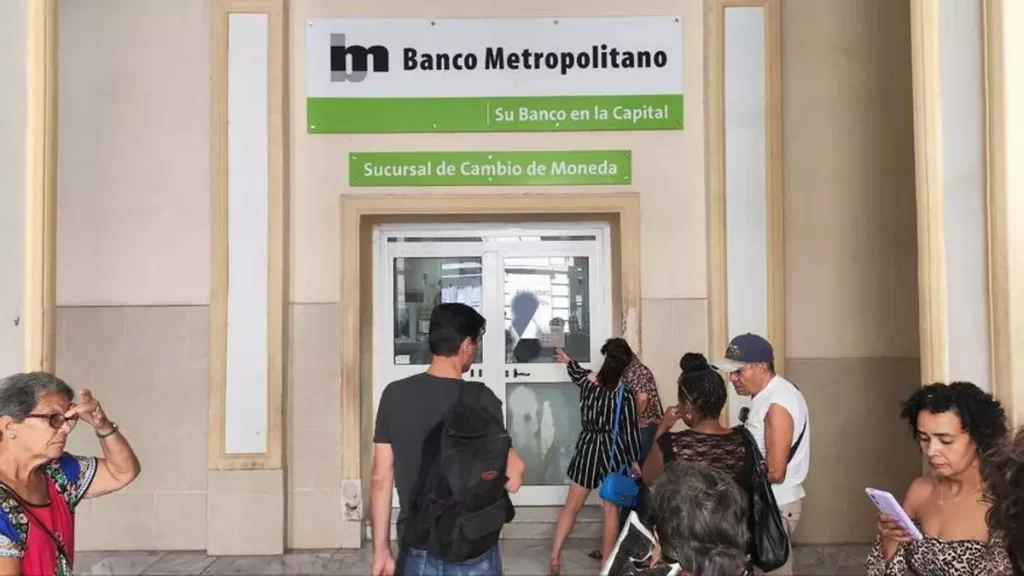
![]() 14ymedio, Havana, 28 March 2024 — The Cuban regime took another step this Wednesday in its attempt to capture a greater amount of foreign exchange. The Clásica card, issued by Fincimex, the financial wing of the Gaesa military conglomerate, can now receive remittances from any country through the Tocopay application, based in Bilbao, Spain. Fincimex also announced days ago the restoration of transfers to American International Service (AIS) cards, rechargeable by the same gateway, which had been suspended since February.
14ymedio, Havana, 28 March 2024 — The Cuban regime took another step this Wednesday in its attempt to capture a greater amount of foreign exchange. The Clásica card, issued by Fincimex, the financial wing of the Gaesa military conglomerate, can now receive remittances from any country through the Tocopay application, based in Bilbao, Spain. Fincimex also announced days ago the restoration of transfers to American International Service (AIS) cards, rechargeable by the same gateway, which had been suspended since February.
The dramatic fall in remittances sent to Cuba in recent years has forced the regime to devise alternatives to attract foreign exchange. In 2023, Cuban emigrants sent just under 1.973 billion dollars to the Island, the same amount as in 2010. This is a decrease of 47% compared to the 2019 figure (3.716 billion).
The Clásica cards, issued by Fincimex bank branches, in which money is deposited in dollars, were created by the regime along with the economic reforms at the beginning of the year and include the option of buying fuel in the gas station in dollars.
Tocopay is the Spanish platform for sending remittances, created for Cuba
Tocopay, the Spanish platform for sending remittances to Cuba, not only offers the possibility of making deposits on the Clásica and AIS debit cards, but also of sending money to the cards in MLC (freely convertible currency) of the Metropolitan, Popular Savings (BPA) or Credit and Commerce (Bandec) banks.
This Thursday, a post on Tocopay’s social networks highlights the benefits of acquiring a Classic card: a 5% discount in Cimex, Caribe and Trimagen stores (all Gaesa companies), and a 10% discount on Gaviota’s tourist facilities, also owned by the military consortium. “That’s not all. New features and incentives will be announced soon,” the post promises.
Tocopay also allows a person to send up to 3,000 dollars or euros per quarter, and the sender can request the creation of an AIS or Classic card for the beneficiary in Cuba, although, in another publication on its social networks, the application clarifies that this service is not yet available. For a remittance of 100 dollars to a Classic card, the gateway charges a fee of $11.54 dollars. For the same amount, to send money to an AIS or MLC card, Tocopay charges $10.15 and $10.47, respectively.
As for the AIS cards, sanctioned in 2020 by the Donald Trump Administration, they were disabled in February, when Fincimex announced a “cybersecurity incident” that paralyzed the implementation of the new prices for fuel, electricity and public transport until the beginning of March.
Another strategy of the regime to evade Washington’s sanctions was the creation in 2020 of the finance company Orbit by the Central Bank of Cuba, “officially” detached from the Armed Forces, and therefore able to process the sending of remittances from the United States.
Since then, Fincimex customers who have AIS cards have not stopped complaining to the financial company about the delay in the deposit of remittances, and they expect the restoration of the service to solve the problem. “I hope they give me the money tomorrow because I’ve been trying since January 29 and it hasn’t arrived yet,” a client complained days ago in the comments section. Another user claimed that since “a month and 20 days ago” she has been waiting for the money.
Nor do the rest of Fincimex’s services seem to be meeting the deadlines established by the company
Nor do the rest of Fincimex’s services seem to be meeting the deadlines established by the company. “What’s the problem with the Metropolitano cards? I’ve been waiting 12 days for the money.” said a third client.
Western Union, another platform that many emigrants use to send money to their relatives on the Island, has not yet resumed its services since the fall of Fincimex’s operations. Days ago, the company said that it had no set date for the restoration of operations, contrary to what several of its agents told 14ymedio last February, when they estimated that the service would be available beginning April 1.
Due to the interruption and delays in these services, which also charge high fees for the deposit of remittances in Cuba, many Cubans residing abroad prefer to send money through other platforms, using the mobile recharge service or simply with friends and mules who travel to the Island with the foreign currency, which allows them to take advantage of the exchange rate on the informal market, almost three times higher than the official one.
According to the record of El Toque, this Thursday the dollar reached 332 pesos in Cuba and the euro 340 at the informal exchange rate, while the MLC remains at 275 pesos.
Translated by Regina Anavy
____________
COLLABORATE WITH OUR WORK: The 14ymedio team is committed to practicing serious journalism that reflects Cuba’s reality in all its depth. Thank you for joining us on this long journey. We invite you to continue supporting us by becoming a member of 14ymedio now. Together we can continue transforming journalism in Cuba.
